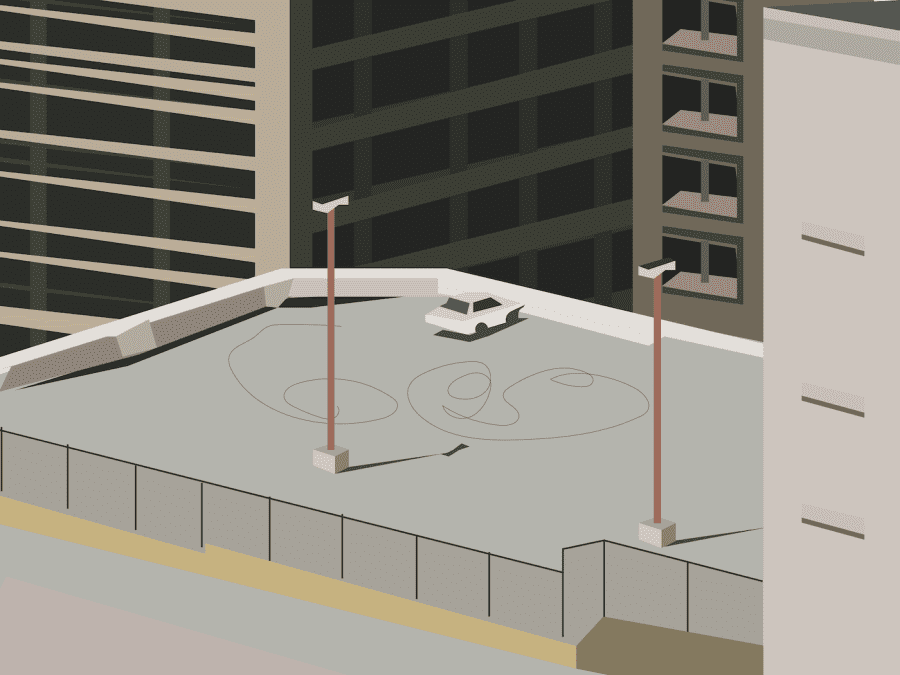Review: Arctic Monkeys dives deeper into space-age lounge wizardry on ‘The Car’
The venerable outfit executes subtle shifts and paves the way for a more intimate experience with the band.
The album cover of Arctic Monkeys latest album, “The Car.” (Illustration by Susan Behrends Valenzuela)
November 3, 2022
After the walloping sonic turnaround between the Arctic Monkeys’ 2013 smash-hit “AM” and 2018’s divisive “Tranquility Base Hotel & Casino,” it was anybody’s guess as to what the band’s next album would sound like. The big question was whether they would drop the sleazy, greaseball, Atlantic City-casino-residency-on-acid sound altogether.
The answer is kind of. On their new record, “The Car,” lead singer Alex Turner eschews the high concept sci-fi premises he cleverly wrote through on “Tranquility Base.” The rest of the band, however, fleshes out their exploration of the grandiose sultriness of lounge music with a funky edge and more gusto than ever.
When they first debuted their new style, it was easy to feel like they were — albeit, to a very successful extent — trying on the sounds of obvious influences like David Bowie, Frank Sinatra, Burt Bacharach. However, they’ve now seemed — with the help of a skillfully employed orchestra backing them up on almost every track — to grow into it in a very natural way. Whereas Turner and the gang were once the latest in line to be the voice of a generation of frustrated British youths, they have now turned towards classical music, gunning into middle-age two decades early.
While Turner bizarrely references “a car” or “The Car” on nearly every single song, there isn’t a weak track to be found on the album. Each song explores a different facet of the overall premise, varying in sound and mood in a way that feels as cohesive as it does consistently fresh. As a lead single, “There’d Better Be a Mirrorball” was a little less than captivating, but returning as an opener, its hypnotic mellotron riff and brushed jazz cymbals feel like the perfect way to ease into the rest of the record’s vibe. The classical virtuosity of that structure makes the melody of the following glam-funk “I Ain’t Quite Where I Think I Am” pack an unexpected punch, asserting the ambitious stylistic exploration of what’s to come.
“Sculptures of Anything Goes” comments on the shifting public perception of the group itself, and the backlash toward their last album from much of their fanbase. Turner esoterically addresses feeling out of place (“How am I supposed to manage my infallible beliefs? / While I’m sockin’ it to ya / Performing in Spanish on Italian TV”), claims of becoming out-of-touch (“Puncturing your bubble of relatability / With your horrible new sound”) and nostalgia for another time (“The simulation cartridge for City Life ’09 / Is pretty tricky to come by”) The wonderfully composed title track similarly explores memory with a delicate guitar strum, as Turner sings “But it ain’t a holiday until / They force you to make a wish / They say, “Climb up this” / And “Jump off that” / “And you pretend to fall asleep on the way back.”
Lyrically, the high points on the record are the back-to-back penultimate duo of “Hello You” and “Mr. Schwartz.” On the funky former, bongos and a particularly memorable phased-out guitar riff back Turner as he portrays a disillusionment with the supposed pleasures of adult life, stunningly singing “Takin’ a dive into your crystal ball / I’ve snorkeled on the beaches fruitlessly / Why not rewind to Rawborough Snooker Club? / I could pass for seventeen if I just get a shave and catch some Z’s.”
The sparser latter track — made up largely of just acoustic guitar and piano — allows for more attention toward his lyrics, describing a mysteriously omnipotent producer-type figure as he sings “Mr. Schwartz is stayin’ strong for the crew / Wardrobe’s lint-rollin’ your velveteen suit / And smudgin’ dubbin’ on your dancin’ shoes” and “Mr. Schwartz is havin’ tea with the grips / Askin’ after all the wives and the kids / It’s at the heart of what the business is.” The vagueness here sparks an irresistible curiosity.
It remains to be seen whether this record will be more popular than their last, but the raw strength of the songwriting that lies at the heart of all the suave ’70s pomp seems to suggest it will. While it is easy to get caught up in the superficial elements of their new stylistic direction, Turner seems to be more in his own skin than ever. Something about the lens of ’70s psychedelia and orchestral lounge music has brought him to write his most poetic and startlingly intimate lyrics to date. It’s hard to overstate the versatility of the man who once wrote the fantastic line “What came first, the chicken or the dickhead?” and now writes to equal effect “A four-figure sum on a hotel notepad / A revelation or your money back That’s what it takes to say ‘good night.’”
Contact Holden Lay at [email protected].























































































































































